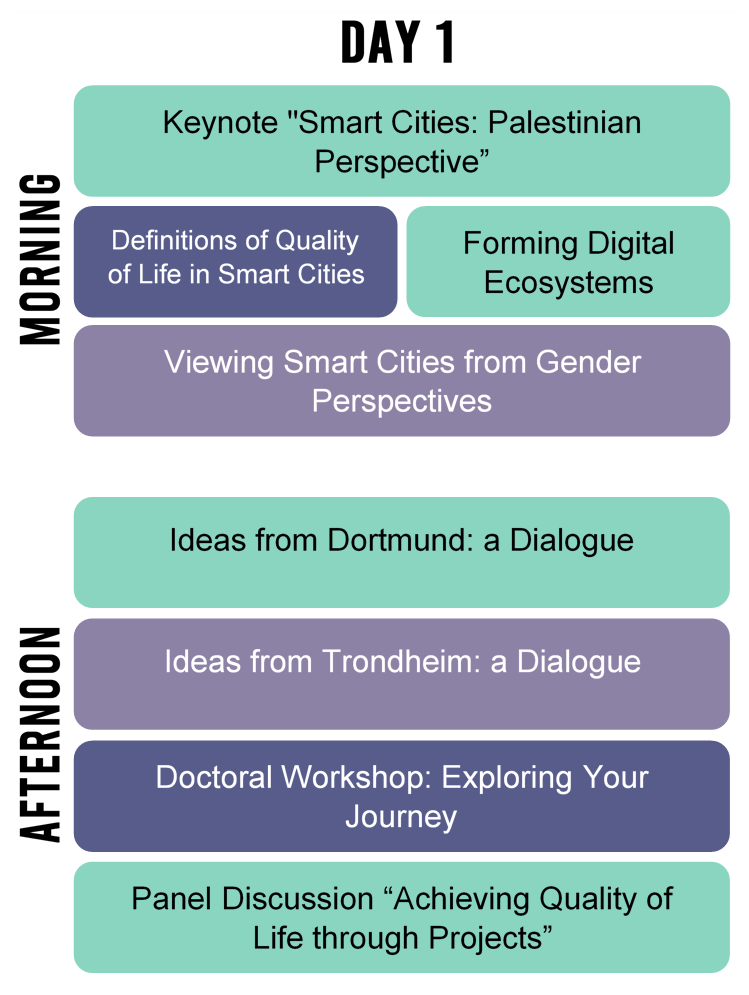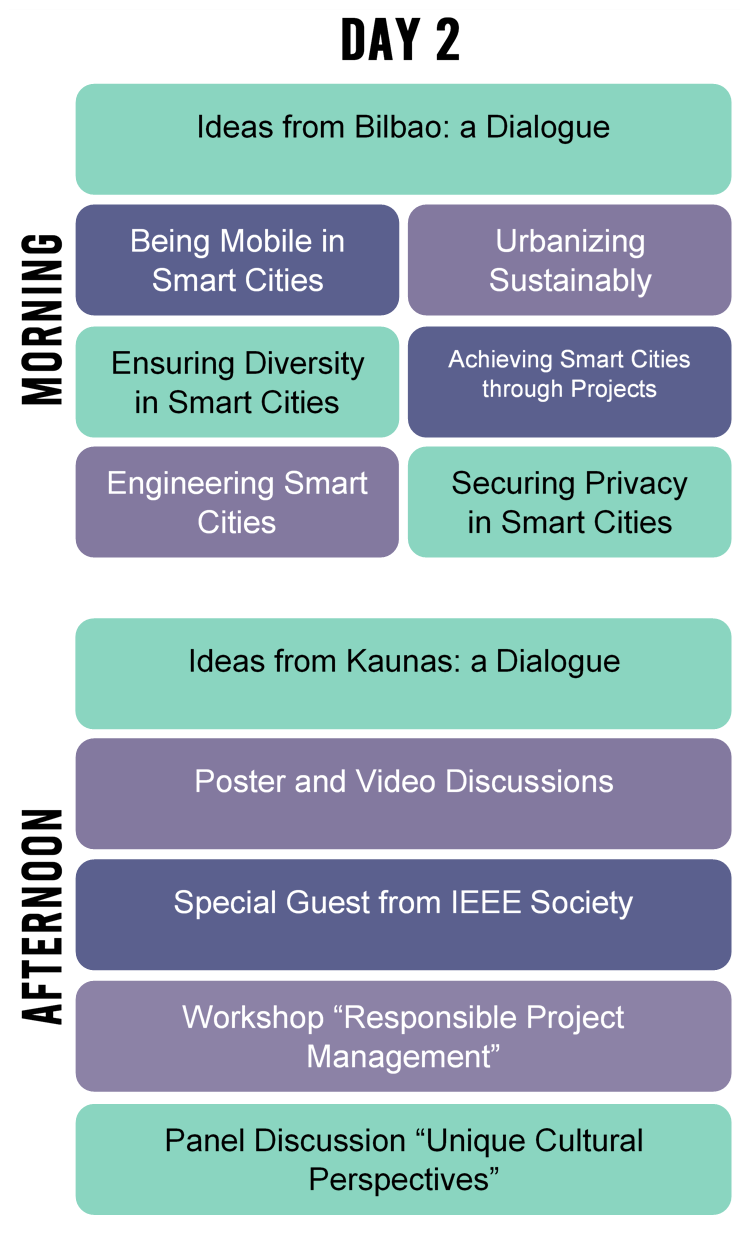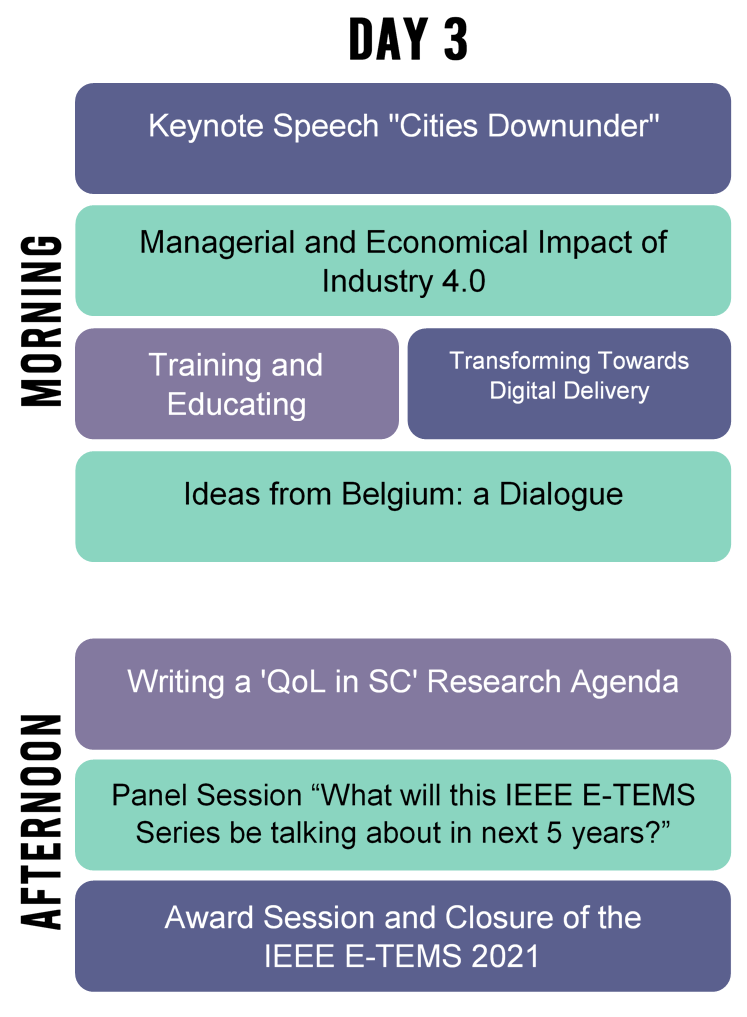PROGRAMME
PRELIMINARY PROGRAMME
You can download the programme here.
Time Zone: Central European Time (CET)
Day 1, 18.03.2021
Greetings from Conference Chair, representatives of Dortmund University of Applied Sciences and Arts, the IEEE TEMS
Chaired by Sergey Bushuyev
Nr 12 Empowering Citizens in a Smart City Project One Step at a Time: a Norwegian Case Study
(Coline Senior, Mina Jowkar, Alenka Temeljotov-Salaj, Agnar Johansen)
Nr 34 Smart City Assessment: An Integrated Framework
(Aizhan Issatayeva, Yeldos Umbetov, Daulet Abdikerim, David Tuganov, Ferhat Karaca, Ali Turkyilmaz)
Nr 39 Analysis of Potential Project Work Accidents – A Case Study of a Construction Project in Malaysia
(Kanesan Muthusamy, Hermenth Raj Gunasegaran, Elango Natarajan, Krishnamoorthy Renganathan)
Nr 40 Smart City Replication and Group Model Building: A Conceptual Comparison
(Patrick Ruess)
To be announced
to be announced
Chaired by Lydia Kaiser
Nr 35 Model-based system engineering of an active, oleo-pneumatic damper for a CS-23 general aviation aircraft landing gear
(Felix Willich, Andreas Sutorma, Uwe Jahn, Merlin Stampa, Carsten Wolff)
Nr 44 Continuous validation of distributed systems and System of Systems through Model-based Systems Engineering support using the IPEK-XiL-Approach on the example of Vehicle-to-Everything
(Moritz Wäschle)
Nr 45 Development of an assessment method for the optimisation of a portfolio of energy supply products
(Jana Schneeloch)
Nr 46 Responsible Project Management Model for Humanitarian Projects
(Leticia Fuentes-Ardeo, Jose Ramon Otegi)
Chaired by Beverly Pasian
Day 2, 19.03.2021
In the first edition of the Smart City Index (2019), Bilbao ranked ninth in the ranking that evaluates the effort and success of a city in adopting smart technologies to improve the lives of its citizens. There is no doubt that Bilbao has changed to the good in the last twenty years. But some shadows do remain, in areas such as inequality or transparency. These could be reduced using intelligent projects.
In this presentation we wish to offer different perspectives to the assessment of the Quality of Life of the city. We try to understand the importance of technology in this environment.
Chaired by Lydia Kaiser
Nr 14 Environmental Impact of Off-grid Solar Charging Stations for Urban Micromobility Services
(Nora Schelte, Hermann Straßberger, Semih Severengiz, Sebastian Finke, Bryce Felmingham)
Nr 19 Selecting Features for the Next Release in a System of Systems Context
(Carsten Wiecher, Carsten Wolff, Harald Anacker, Roman Dumitrescu)
Nr 26 Smart Ticketing System for Kazakhstan Public Transport: Challenges and the Way Forward
(Malika Aitzhanova, Madina Jangeldinova, Adilkaiyr Kadyr, David Tuganov, Idriss El-Thalji, Ali Turkyilmaz)
Nr 36 Shaping Smart Intermodality between Waterborne and
Landside Transport in the Coastal City of Stavanger
(Carolina Sachs, Andreia Lopes Azevedo, Mikal Dahle, Espen Strand Henriksen)
Chaired by Nigel Williams
Projects have begun to incorporate data analytics tools and techniques. In this workshop, we will begin to explore the scope and nature of Project Analytics
- What are the threshold concepts in project management?
- Sources of data in Project Management
- Analytical approaches for PM Data
On the Complementarity of Digital Technologies
The adoption of digital technologies is associated with a competitive advantage of organizations and differentiation of cities. Management scholars have already shed some light on the drivers and the effects of digital technologies’ adoption. However, less attention was devoted to the complementarity of digital technologies. While companies adopt various digital technologies, these cannot be adopted at once because of the lack of resources. Also, some digital technologies are related by sequential relationship. For example, analytic technologies exploit organizational data that must be collected and stored. In this presentation, two approaches for studying the issue of complementarity of digital technologies are presented. The “configurational” approach reveals digital technologies configurations that lead to increased substantive and symbolic performance. The “sequential” approach informs about the most prevalent sequences of adoption of digital technologies. Both approaches expose the patterns of adoption of digital technologies.
Chaired by Jose Ramon Otegi-Olaso, Nigel Williams
Nr 7 Opportunities and Limits in Designing an Individual Hybrid Process Model
for Project Management
(Martina Königbauer)
Nr 30 Smart cities transformation project management time-cost balancing model
(Michael Dombrowski, Anatoly Sachenko, Oleg Sachenko, Zbyshek Dombrowski)
Nr 31 Analysing the Impact of Agile Project Management on Organisations
(Sascha Artelt)
Nr 5 The Concept of an Educational Ecosystem for the Digital Transformation
of the Ukrainian Economy
(Tetiana Kovaliuk, Nataliya Kobets)
Nr 10 Networking in Smart Cities – Qualitative Analysis
for the Demand-Oriented Development of a Care Platform
(Jelena Bleja, Dominik Wiewelhove, Tim Krüger, Uwe Großmann)
Nr 29 Smart Competences for Smart Citizens
(Olha Mikhieieva)
Nr 13 Active History: Creating Sustainable Cities Through Heritage Trails
(Rebekah Mills)
Nr 15 A Crypto-Token Based Charging Incentivization Scheme
for Sustainable Light Electric Vehicle Sharing
(Kevin Wittek, Sebastian Finke, Nora Schelte, Norbert Pohlmann, Semih Severengiz)
Nr 38 Agile Principles in Automotive Software Development: Analysis of Potential Levers
(Syeda Komal Anjum, Carsten Wolff)
Nr 4 Holistic Concept for the Implementation of Smart Parking
in Small and Medium-Sized Cities
(Kornelia Schuba, Magdalena Förster, Annika Henze-Sakowsky, Jens-Peter Seick, Martin Rabe)
Nr 18 Developing Smart Cities Using Social Cyber-Physical Systems: Education Driver
(Pedro Ponce, Juana Isabel Méndez, Adán Medina, Omar Mata, Alan Meier, Therese Peffer, Arturo Molina)
Nr 21 Modelling Circularity in Bio-based Economy Through Territorial System Dynamics
(Manuel E. Morales, Stéphane Lhuillery)
Nr 37 Model-based Systems Engineering of an Active, Oleo-Pneumatic Damper for a CS-23 General Aviation Aircraft Landing Gear
(Felix Willich, Carsten Wolff, Andreas Sutorma, Uwe Jahn, Merlin Stampa)
Human interactions in a highly networked world – are human interactions facilitated with or by technology and what are the challenges?
Chaired by Beverly Pasian
Nr 1 Emergent and Unexpected Sources of Value from Radio Astronomy Projects: A Narrative Approach to Value Co-Creation and Co-Destruction
(Alexia Nalewaik, Nigel Williams)
Nr 16 A smooth and accepted transition to the future of cities based on the Standard ISO 37120, Artificial intelligence, and Gamification Constructors
(Juana Isabel Méndez, Pedro Ponce, Adán Medina, Therese Peffer, Alan Meier, Arturo Molina)
Nr 25 Achieving Life in Smart Cities: Chances and Challenges for a Holistic Care Platform
(Jelena Bleja, Dominik Wiewelhove, Tim Krüger, Uwe Großmann)
Nr 27 Practical Approach for the Development of Digital Guidelines for Smart Cities
(Magdalena Förster, Martin Rabe, Arno Kühn, Roman Dumitrescu)
Chaired by Alexia Nalewaik
This open, guided discussion will encourage debate on culture in the context of smart city research, as an essential element of quality of life. With discussion not restricted to the panel and open to all attendees, progressed through a series of questions, participants will delve into culture as part of city planning and development, how it can be measured, and what education and research are needed on this topic to raise awareness.
Day 3, 20.03.2021
Australia is highly urbanized and based on the 2016 Australian Bureau of Statistics (ABS), more than three-quarters of its population live in urban areas. Along with rapid urbanization, Australia has also faced various complex challenges in recent years, including water crises, aging population, bushfires and pandemic that are critical to its environment, health, economy and society. The need to address the upcoming national challenges along with the need to keep up with the rapidly changing technological world, require Australian cities to adopt smart city approaches to enhance their organizational capacity. To this end, the Australian government committed to its smart cities plan in 2016 to encourage productive, accessible and livable cities with a clear focus on serving their citizens.
This presentation discusses the challenges Australia is facing in the 21st century along with the existing smart city strategies and development plans. The presentation follows to investigate Australian public and private smart cities projects, how the benefits of citizens were considered in the projects and the impacts of the projects on Australian communities and on resolving Australia’s national challenges. The presentation concludes with discussion around the challenges and opportunities involved and provides suggestions for the future development of smart cities in Australia.
Chaired by Peter Arras and Bassam Hussein
Nr 2 Collaboration for Innovation Between Universities and Smart Cities
(Claudia Doering, Markus Schmidtner, Holger Timinger)
Nr 6 Case Study of University Ecosystem Development
(Oleksandr Kapliienko, Galyna Tabunshchyk, Tetiana Kapliienko, Roman Shloma, Serhii Shylo)
Nr 41 Effect of Digital Transformation on Adoption of an Effective Virtual Workplace in Organizations
(Joshua Olusegun Fayomi, Zainab Abdulqadir Sani)
Nr 43 International Interinstitutional Coordination of Vocational Education and Training of Programmers for Industry 4.0 Needs
(Peter Kuna, Alena Hašková, Peter Arras)
to be announced
Chaired by Beverly Pasian
Announcements of the conference Series.
We will announce the winners of such award categories as:
- Best paper
- Best reviewer/Best review
- Best comment or question made during the conference
The winners will receive a gift (to be announced during the opening).




